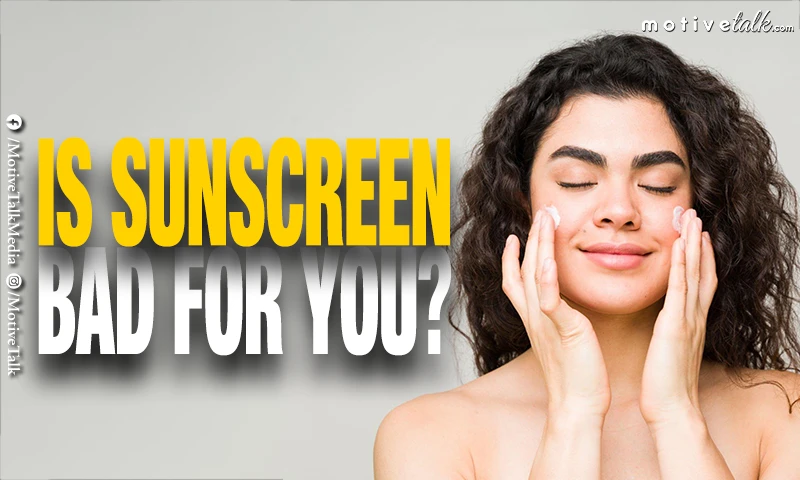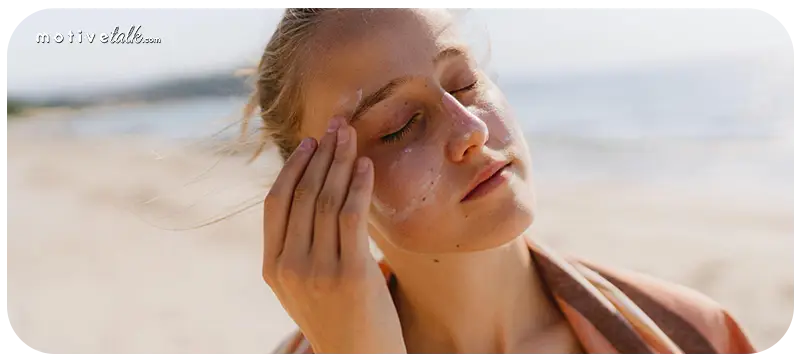LifeStyle
Is Sunscreen Bad for You? : Unmasking the Truth! (September 2023)

Welcome you beautiful people to this blog which holds the answer to all your sensitive and sensational queries related to sunscreen. The passion for nurturing your skin’s health and radiance has brought you to this blog where the truth behind the sunscreen is unmasked!
In this sunkissed aesthetic world of skincare and protection lies many myths and misinformation regarding this most common skin care product. Whether sunscreens are effective or not? Are they harming your skin cells? Are they responsible for skin cancers and other skin diseases? Is sunscreen bad for your skin? Questions are many but it’s hard to find answers that are based on facts, and easy to understand.
Is Sunscreen Bad for You?
In recent years, sunscreen safety concerns have surfaced. While sunscreen is essential for protecting our skin from harmful UV rays, some have questioned whether it might be doing more harm than good. Those who care about their skin understand the importance of protecting it from the harmful rays of the sun. In this blog post, we desire to provide you with the proper knowledge to safeguard your skin. In this blog post we will delve into the science, the ingredients, and the real-world experiences that will clarify your confusion, ‘Is sunscreen bad for you?’ And will eventually inspire you to make the best choices for your skin. So, dive right in and see for yourselves, is sunscreen bad for you?
Common Misconception
Is sunscreen bad for you? Sunscreen is generally not considered bad for human skin when used correctly. However, there can be misconceptions or concerns that lead some to question its safety. Here are a few reasons why some people might think sunscreen is bad for the skin:
-
Chemical Ingredients causes skin problems
Some sunscreens use chemicals like oxybenzone or avobenzone, these chemicals might irritate the skin or trigger allergies in a few people. And people often wonder, ‘Is sunscreen bad for your skin?’ However, it’s essential to understand that these reactions are relatively rare and affect only a small percentage of users.
Many sunscreen brands also recognize these concerns and have responded by offering alternatives with physical blockers like zinc oxide or titanium dioxide. These mineral-based ingredients are known for being gentler on the skin and are less likely to cause irritation or allergic reactions. So, while the question ‘Is sunscreen bad for you?’ may arise, it’s important to choose a sunscreen that suits your skin type and preferences to ensure both effective sun protection and skin comfort.
-
Sunscreen Blocks All Sunlight, Preventing Vitamin D Production
This particular concern confuses us between the questions like; ‘Is sunscreen bad for you?’ or ‘Is sunscreen good for you?’ Well, sunscreen doesn’t completely block sunlight; it filters out harmful UV rays while allowing your skin to produce vitamin D from the sun’s beneficial UVB rays. You can still get enough vitamin D with sunscreen on.
There’s a misconception that using sunscreen prevents the body from producing vitamin D. In reality, sunscreen permits your skin to receive sufficient UVB rays for vitamin D synthesis while shielding it from the harmful effects of UVA and UVB rays. If vitamin D levels are a concern, a short period of sun exposure without sunscreen can suffice.
-
Sunscreen Causes Acne or Breakouts
People with sensitive or acne-prone skin may worry that sunscreen can clog pores and trigger breakouts. Is sunscreen bad for acne-prone skin? Is sunscreen bad for you then?
Acne is more likely caused by other factors, like sweat and dirt, which can be managed with proper skincare. There are many sunscreen options, including non-comedogenic (won’t clog pores) formulations. While this can happen with certain formulations, non-comedogenic sunscreens are designed not to clog pores and are a better choice for those with such concerns.
-
Chemical Absorption: sunscreen chemicals into the bloodstream
So, is sunscreen bad for you? Although minimal quantities of these chemicals may be absorbed, extensive research shows that they are generally safe at the levels found in sunscreen products. However, concerns about their potential long-term effects have led to the popularity of mineral-based sunscreens like zinc oxide and titanium dioxide.
These alternatives create a protective surface barrier, reflecting and scattering UV rays without being absorbed into the skin, making them a preferred choice for those with sensitivities or chemical absorption worries.
Why is it recommended to use sunscreen?
Sunscreen isn’t just about avoiding a tan; it’s your skin’s superhero. UV rays from the sun are like sneaky villains, causing sunburn, premature aging, dark spots, and even increasing the risk of skin cancer, including deadly melanoma. Dermatologists and health experts widely advise using sunscreen as a crucial tool to shield the skin from the harmful effects of UV (ultraviolet) radiation from the sun. It is designed to provide a protective barrier against these harmful effects. Sunscreen is your daily shield, protecting you from these harmful rays, even on cloudy days! The following will get you closer to your answer of ‘Is sunscreen bad for you?’
-
UV Radiation Absorption
Sunscreen contains various active ingredients, some of which are chemical filters. These filters are designed to be absorbed into the skin and act as a defense mechanism. When UV rays from the sun penetrate your skin, these chemical filters absorb the radiation and convert it into harmless heat. By doing so, they prevent the UV rays from damaging the DNA in your skin cells, reducing the risk of sunburn and skin damage.
-
UV Reflection and Scattering
Some sunscreens, particularly those with mineral-based ingredients like zinc oxide and titanium dioxide, work differently. Instead of being absorbed, these minerals create a physical barrier on the surface of your skin. They reflect and scatter the UV rays away from your skin, preventing them from penetrating and causing harm.
-
Preventing Premature Aging
Exposure to UV radiation can accelerate the aging of your skin. Sunscreen helps prevent premature aging by reducing the formation of wrinkles, fine lines, and age spots caused by UV damage.
-
Reducing Skin Cancer Risk
Prolonged exposure to UV radiation is a leading cause of skin cancer. Regular use of sunscreen significantly lowers your risk of developing skin cancers, including melanoma, squamous cell carcinoma, and basal cell carcinoma.
-
Preserving Skin Health
Sunscreen helps maintain your skin’s health and vitality by protecting it from the harmful effects of UV radiation, which can otherwise lead to dryness, redness, and other skin issues.
The Importance of Proper Application, SPF, and Skin Types
To ensure you receive the full benefits of sunscreen, follow the recommended guidelines for application. Typically, this involves applying a generous amount of sunscreen to all exposed skin areas at least 15 minutes before sun exposure and reapplying it every two hours or more frequently if swimming or sweating. Properly applying sunscreen is a simple yet crucial step in maintaining skin health and protecting against the harmful effects of the sun.
-
Adequate Sunscreen Application
To maximize the benefits of sunscreen and minimize any potential drawbacks, it’s crucial to apply it correctly. Insufficient sunscreen application often means inadequate protection. To maximize the protective benefits of sunscreen, it’s essential to apply it generously and regularly, especially when spending time outdoors. Remember to choose a broad-spectrum sunscreen that protects against both UVA and UVB rays, and follow recommended application guidelines for the best results in preventing skin damage.
-
SPF Matters
The Sun Protection Factor (SPF) of your sunscreen matters. Higher SPF provides greater protection, but no sunscreen offers 100% protection. The SPF rating on sunscreen determines its level of protection against UVB rays, which cause sunburn. Choose an SPF based on your planned sun exposure. SPF 30 is generally recommended for everyday use, but you might opt for SPF 50 or higher for extended outdoor activities or if you have fair or sensitive skin. Reapplying throughout the day is still essential, especially if you are spending extended periods outdoors.
-
Choose as per your skin type
All skin types are different so should be their sunscreen and other skin care products. You must choose your sunscreen according to your skin type because it ensures optimal protection and prevents potential skin issues. Different skin types have varying needs, whether you have sensitive skin that requires gentle, hypoallergenic formulas or oily skin that benefits from non-comedogenic, oil-free sunscreens. Selecting sunscreen tailored to your skin type enhances comfort and effectiveness while reducing the risk of adverse reactions or breakouts.
Conclusion
In our journey to uncover ‘Is Sunscreen Bad for You? Unmasking the Truth,’ we’ve peeled back the layers of myths and misconceptions to reveal sunscreen’s true role as your skin’s steadfast protector. It’s the valiant defender, standing between your skin and the sun’s harmful rays, preventing damage and reducing the risk of skin cancer.
As we reveal this skincare secret, remember to embrace the power of sunscreen by applying it generously and frequently. Combine it with sun-smart practices, like wearing stylish sun hats or caps and seeking the cooling embrace of shade. This advice isn’t just for the ladies; it’s a skin-saving tip for our gentlemen too. With this newfound knowledge, your skin can confidently radiate its natural beauty, all thanks to sunscreen; your reliable companion!
You may also read
-
Who is3 months ago
Who Is Fauzia Mubarak Ali? Famous Cat Stevens Wife & Their Children (Update: Jan 2024)
-
Comics9 months ago
Best Shrek Quotes About Life From The Shrek Series
-
Miscellaneous2 years ago
Lone Wolf Quotes – That Will Trigger Your Soul and Mind
-
Miscellaneous7 months ago
Warrior Quotes – That Will Make You More Stronger
-
Miscellaneous11 months ago
Top 27 Letterkenny Quotes – That Will Make Anyone Laugh
-
Super Hero2 years ago
Captain America Quotes – All Are Ultimate Leadership Quotes
-
Politicians2 years ago
Most Powerful Vladimir Putin Quotes – That Will Blow Your Mind
-
Miscellaneous2 years ago
Dalai Lama Quotes – That Will Change Your Values and Vision






























